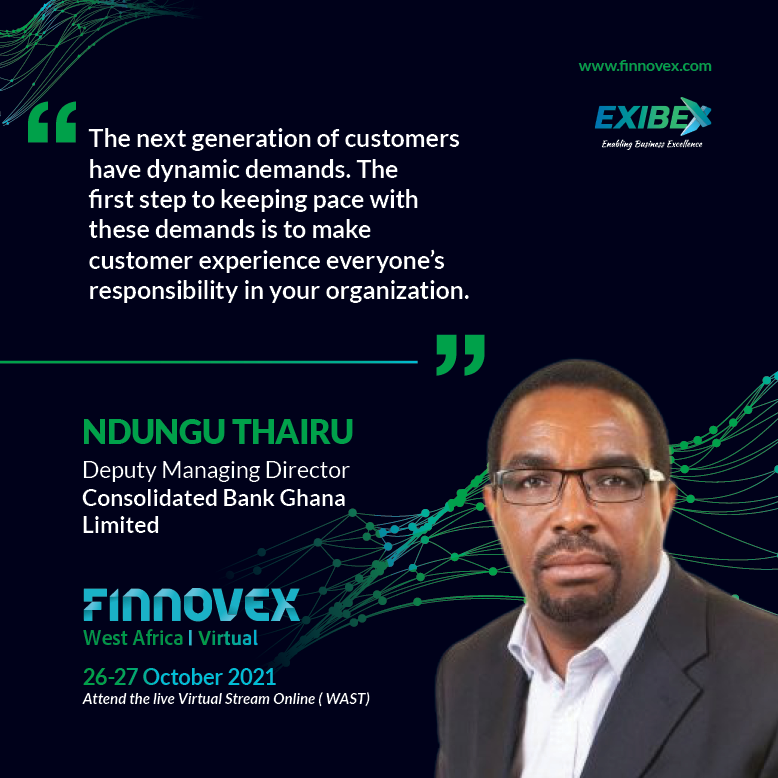Speaker Interview- Ndungu Thairu
HOME / Speaker Interview- Ndungu Thairu

Mr Ndungu Thairu has a track record of efficiently implementing new business strategies, delivering innovative solutions, and facilitating business operations. He is adept in formulating processes for operational efficiency, costs reduction and enhance revenues in order to meet the company's fiscal goals and objectives.
Mr Thairu will be speaking live at Finnovex West Africa Summit.
Please have a look at his view on our upcoming Leading Summit on Financial Services Innovation and Excellence held from 26th – 27th October 2021.
Q- How would you describe the 3 ways of leveraging the right Innovative technologies for organisational success?
The first means of leveraging innovative technology is to build a strong IT backbone to support the core business of the organization. In this ever-changing banking industry, you have to first build a strong technological infrastructure by utilizing current technologies such as cloud computing etc.
After building a strong infrastructural base the next step for the business is to use innovative technologies to build products that meets the dynamic needs of the customer. This can be achieved internally or through partnerships with other institutions. In the banking sector these collaborations can be between banks or fintech companies.
The third way of leveraging innovative technologies is better decision making. Innovative Technologies allows the mining of a huge array of information. Institutions that leverage on technologies such as Big Data have access to accurate and fascinating information. Access to precise information contributes significantly to making informed business choices. Businesses are able to leverage on Big Data to analyse complex data and predict future customer actions and behaviour.
Q-What have been the key challenges and benefits to both banks and employees within the Banking and Financial Services Industry?
Some of the challenges faced by Banking and Financial Services Industry in their digital transformation journey are impractical expectations on the side of some businesses who are overly optimistic by focusing just on digitalizing their businesses without looking at the transformation side. Like George Westerman said, “Digital transformation is less of a digital problem than it is a transformation problem”. There is also Lack of Talent, Digital Culture and Constant change in the expectations of customers.
Some of the benefit of leveraging digital technologies are speed, ability to seamlessly meet the dynamic expectations of the customer and innovative technologies that provide the avenues for employees to reskill etc.
Q-How can teams, processes and operational structures be reformed as we are currently seeing a surge in outsourcing talents?
Employees should be reskilled and trained both internally and externally. Training should be integrated into the daily workflows of employees to ensure adaptability.
Q-Can you highlight some of the implications of balancing human expertise with automated processes as the hybrid future workforce await?
Balancing human expertise with automation will bring process effectiveness and efficiency. Humans are generally good at handling tasks that uses cognitive skills whiles computers are good at handling the more routine tasks. Finding the right balance will help the organization to be more prepared for the future.
Q- How might traditional bank branches be re-purposed post-COVID and beyond?
The branch has been going through a rapid change even before COVID. The new branch may not be for the usual daily banking needs. The branches should operate more around advisory and can co-locate with other industries like in a supermarket to give the customer more products offering. There will be the need for a human touch point of some sort in the future, but the purpose will change completely.
Q-.Can you identify 3 essential steps to follow in rebuilding an organization to keep the pace with the next generation of customers?
The next generation of customers have dynamic demands.
The first step to keep pace with these demands is to make customer experience everyone’s responsibility in your organization. Get everyone in the company involved.
Operationalize customer empathy. Build an organization that understands the customer. Understanding invigorate empathy, and empathy boost trust. Customers are more likely to be loyal to your business when they feel well understood and acknowledged.
Establish good lines of communication within the organization. Make sure it’s easy for everyone to communicate and stay on the same page so that everyone in the organization will speak the same language to the customer.
Q-. In leveraging advanced technologies, would you say it has promoted talent training?
Leveraging advanced technologies like Big Data, AI, Machine Learning etc. has led to a shift in how we work. This has called for organizations and employees to reskill and adapt to the new ways of doing things. Banks are now sourcing new employees who are vexed in these new areas and some are also constantly training existing staff to utilize the benefits these technologies bring.
Q-.As industry peers are getting ready to attend the conference, got any advice for them?
My advice for industry leaders is, in as much as we are digitizing and integrating advanced technologies into our operations, we should not put a blind eye to investing in information security.